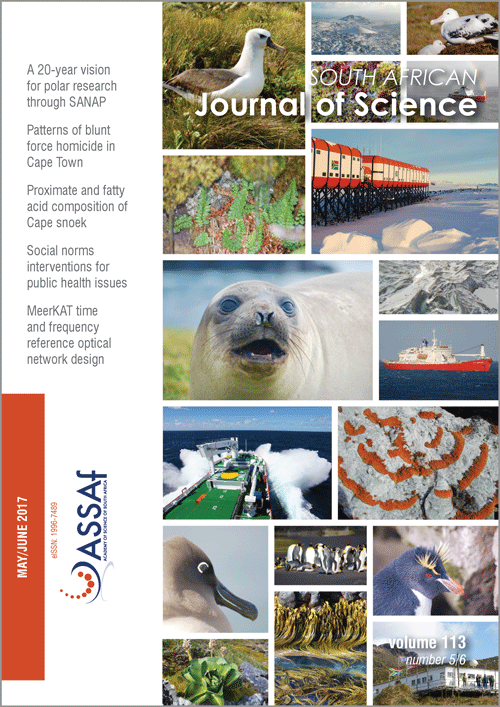Isolation and characterisation of endocrine disruptor nonylphenol-using bacteria from South Africa
DOI:
https://doi.org/10.17159/sajs.2017/20160287Keywords:
biodegradation, endocrine disrupting chemicals, phylogenetic analysis, bioremediation, PseudomonasAbstract
Endocrine disrupting chemicals (EDCs) are synthetic chemicals that alter the function of endocrine systems in animals including humans. EDCs are considered priority pollutants and worldwide research is ongoing to develop bioremediation strategies to remove EDCs from the environment. An understanding of indigenous microorganisms is important to design efficient bioremediation strategies. However, much of the information available on EDCs has been generated from developed regions. Recent studies have revealed the presence of different EDCs in South African natural resources, but, to date, studies analysing the capabilities of microorganisms to utilise/degrade EDCs have not been reported from South Africa. Here, we report for the first time on the isolation and enrichment of six bacterial strains from six different soil samples collected from the Mpumalanga Province, which are capable of utilising EDC nonylphenol as a carbon source. Furthermore, we performed a preliminary characterisation of isolates concerning their phylogenetic identification and capabilities to degrade nonylphenol. Phylogenetic analysis using 16S rRNA gene sequencing revealed that four isolates belonged to Pseudomonas and the remaining two belonged to Enterobacteria and Stenotrophomonas. All six bacterial species showed degradation of nonylphenol in broth cultures, as HPLC analysis revealed 41–46% degradation of nonylphenol 12 h after addition. The results of this study represent the beginning of identification of microorganisms capable of degrading nonylphenol, and pave the way for further exploration of EDC-degrading microorganisms from South Africa.
Significance:- First report of endocrine disruptor nonylphenol-using bacteria from South Africa
- Six bacterial species capable of using nonylphenol as a carbon source were isolated
- Results will pave the way for further exploration of endocrine disruptors degrading microbes from South Africa
Published
Issue
Section
License

All articles are published under a Creative Commons Attribution 4.0 International Licence
Copyright is retained by the authors. Readers are welcome to reproduce, share and adapt the content without permission provided the source is attributed.
Disclaimer: The publisher and editors accept no responsibility for statements made by the authors
How to Cite
- Abstract 744
- PDF 728
- EPUB 201
- XML 237













.png)